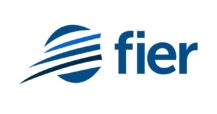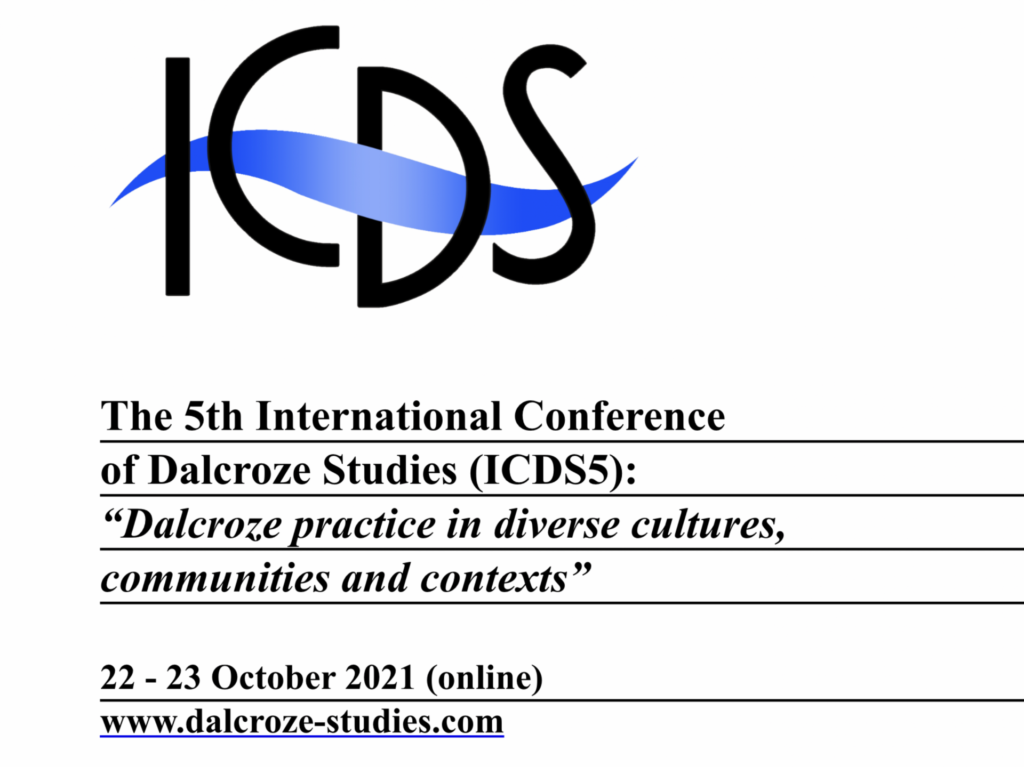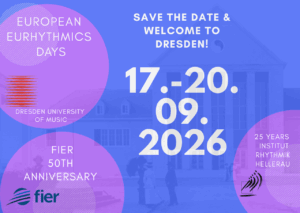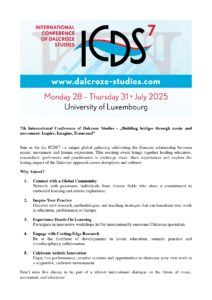The 5th International Conference of Dalcroze Studies (ICDS5):
“Dalcroze practice in diverse cultures, communities and contexts”
22 – 23 October 2021
The conference
The aim of ICDS5 is to present the best of current research and practice within Dalcroze Studies and related fields. ICDS is a biennial, global, transdisciplinary forum, open to viewpoints from education, the arts and humanities, and the social, natural, health and life sciences. We welcome practitioners, students and established scholars alike.
This year our theme is Dalcroze practice in diverse cultures, contexts, and communities. It will allow us to discuss how and where Dalcroze is practiced, and by whom, with a special focus on the relationships between people, practice, and place. The conference will be relevant to those working in music, education, dance, somatic practices, theatre, and therapy, as well as other fields.
Keynotes (confirmed):
Professor Nicholas Rowe
UNESCO Chair in Dance and Social Inclusion, Associate Dean (Research) Faculty of Creative Arts and Industries, University of Auckland
Dr Liesl van der Merwe
Associate Professor, North-West University, Potchefstroom, South Africa
Call for submissions
Dalcroze practice can be found worldwide, in a variety of cultures, communities, and contexts. It is a living practice that continually evolves, often in response to global education and health challenges.
ICDS5 welcomes presentations that explore: the interaction between Dalcroze practice and the cultures in which it is found; the characteristics of the communities that sustain and develop it; and the many contexts in which Dalcroze practice has been – and can be – found.
ICDS5 invites presentations relating to practice, research, and theory. It embraces a wide range of disciplines and areas, such as: anthropology, architecture, biomedical science, communication science, cultural studies, dance studies, education, ethnomusicology, gender studies, history, literature, media studies, music education, musicology, music therapy, music cognition and music neuroscience, pedagogy, philosophy, politics, psychology, sociology, somatic practices, theatre and performance studies, and visual arts.
The topics of presentations and performances might include, but are not limited to:
- The contexts where Dalcroze takes – or has taken – place, including contexts where it might not be the main focus.
- How contexts for participation in Dalcroze are influenced by their place in historical time, physical location, and networks of social relationships.
- How communities of Dalcroze teachers, supporters, and organisers form, disperse, and cross-fertilise.
- Dalcroze as it relates to: communities of musical practice; learning communities; digital and online communities; community music; and community music therapy.
- The relationship between Dalcroze and culture, with regard to music, movement, language, belief systems, tradition and so on.
- Dalcroze within different learning cultures.
- Disciplinary or organisational cultures (e.g. educational, artistic, research, medical, managerial etc.) that support, or otherwise interact with, Dalcroze practice.
- Diverse cultural expressions of Dalcroze philosophy and practice.
- The diversity of participants in Dalcroze settings, with regard to characteristics such as gender, ethnicity, ability, and socio-economic background.
- Dalcroze / rhythmics practice in an increasingly globalised, multi-cultural, and hyper-diverse society.
Types of submission
Note: The length of the discussion for workshops and performances is determined by the presenters.
Papers (30 minutes, including ~8 for questions/discussion)
For ICDS5, we are offering paper opportunities in two categories:
(i) Spoken research papers. These are the presentation of research, explaining aims, approaches, findings, and conclusion, as appropriate to the field.
(ii) Spoken practice papers. These are the presentation of “good practice,” explaining novel pedagogical/therapeutic/artistic approaches and/or theories, and discussing the implications for future work. Please consider these questions: What is it about? What did you do? What did you find out? How do make sense of this? Why does this matter? What did you learn?
Workshop (60 minutes)
Workshops are practical sessions involving delegate participation, and that emphasize the conference theme. For workshop proposals, please provide information about the Background, Aims, Interactive Participation, Implications, and the Specific Value and Meaning.
Paper & Workshop (90 minutes)
This format combines a spoken presentation (research or practice) with a workshop. For proposals, please provide information about the Background, Aims, Interactive Participation, Implications, and the Specific Value and Meaning.
Symposium (90 minutes, including ~15 minutes for questions/discussion)
A symposium is a shared platform for 3–6 delegates to present a specific research topic in-depth and to discuss each other’s work in a public forum. In the abstract submission, please provide the list of presenters and indicate who will chair the symposium. Also, provide background information about the general topic to be discussed and what each presenter will contribute to the discussion. There is some flexibility in how presenters will organize this time.
Roundtable (90 minutes)
In contrast to the symposium, a roundtable is a semi-planned conversation amongst stakeholders, who invite other delegates from the conference to contribute to the discussion on the day. Roundtable organizers lead a public discussion with a view to arriving at shared understandings, new insights and/or proposals for action. For these proposals, please indicate who will organize the roundtable discussion (there may be more than one organizer), who will chair it on the day, information about the topics to be discussed, and objectives or anticipated outcomes of the discussion.
Performance (timings variable)
Please note that the committee may request that the timing of accepted performances be altered to suit the conference timetable.
Poster
This will be a 5-minute video (a virtual poster), made available to delegates online. Poster presenters will be asked to include an email address on the video so that delegates can contact them to ask questions. The conference organisers will provide presenters with details of how to transfer the videos.
Submission Procedure
Submit your proposal online.
Deadline for all submissions: Monday 31 May 2021, 23:59 (GMT).
Technological Information:
ICDS5 will be held online. In order to present at the conference, it will be necessary to have a stable internet connection, a webcam, and a microphone (for paper presentations, computers with a built-in webcam and microphone should be sufficient; workshop presenters may require an external webcam and microphone). If a presentation is accepted, and these technological requirements present a barrier to participation, it is also possible to record presentations for the paper, poster, and performance formats, to be broadcast by the conference organizers on the day.
The language of presentations is English.
Please note: delegates may submit a maximum of three proposals. If submitting three, at least one of them must be collaborative.
When you submit online, you will be asked to enter the following information:
- Title of presentation
- Type of presentation (research paper, practice paper, workshop, symposium, roundtable, performance, poster)
- Requirements (e.g. audio-visual, spaces, instruments)
- Name/s of presenter/s
- Affiliation (i.e. principal place of work/study, or, if appropriate, ‘Independent’)
- Country of residence
- Email address/es
- Description (all submissions must be submitted as Word files, in exactly the format set out in the template downloadable here: https://www.dalcroze-studies.com/submissions). Proposals should describe how they relate to the conference theme.
- Biography (75 words). This should start with your name and must be in prose (i.e. not a list of appointments). For submissions with multiple authors, please give biographies for all presenters and chairs, if appropriate.
Submissions not meeting these requirements will be returned.
Please check your submission very carefully for language and spelling before submission. ICDS no longer offers any editorial support for presenters. Unless you are requested by the Scientific Committee to amend the proposal, the version you submit will be published in the conference programme and this will be permanently available online after the event.
Presenters will be notified by 01 July 2021 and the deadline to confirm presenting is 15 July 2021.





